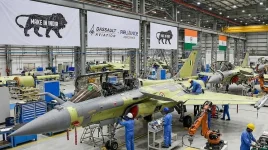- Views: 3K
- Replies: 38

India is positioning itself to become a major player in the global drone market, aiming to challenge the long-standing dominance of Chinese tech giant DJI. This move comes amidst growing concerns over security and data privacy related to DJI's products.
Industry experts predict the global drone market will soar to $50 billion by 2025, fueled by diverse applications across agriculture, infrastructure, logistics, and more. India, with its vast agricultural sector and expanding infrastructure needs, presents a lucrative market for drone technology.
However, security concerns surrounding DJI's alleged ties to the Chinese Communist Party have raised alarms worldwide. These concerns have intensified the demand for a reliable and independent alternative, prompting India to seize the opportunity to develop its own drone industry.
A thriving Indian drone sector would not only reduce the nation's reliance on Chinese technology but also bolster national security and foster self-reliance in critical areas. Additionally, increased competition could spur innovation, leading to more advanced and affordable drone solutions for consumers and businesses alike.
The Indian government, along with private investors, is playing a pivotal role in nurturing the nascent drone industry. Investments in research and development, coupled with supportive policies, are expected to accelerate the growth of Indian drone startups.
While challenges remain, including bridging the technological gap with established players like DJI, the Indian drone industry is poised for significant growth. As the demand for drones continues to rise, India's entry into the market could reshape the landscape and usher in a new era of innovation and competition.





